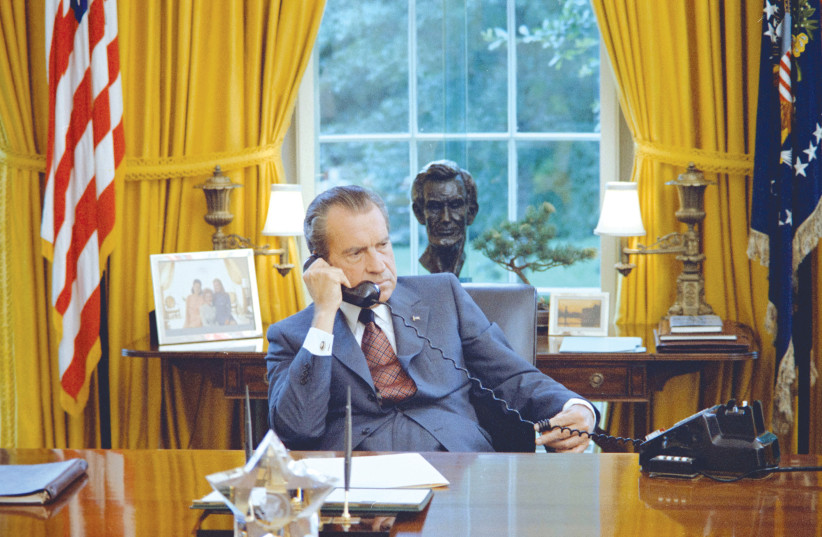In 1973, the United States came to Israel’s rescue. In what became known as Operation Nickel Grass, President Richard Nixon sent planeloads of equipment to Israel, totaling some 25,000 tons. Israel had been surprised by the Egyptian and Syrian militaries on Yom Kippur, and it desperately needed help.
The equipment sent by the US varied. There were M60 Patton tanks, CH-53 Sea Stallion helicopters, shells, guns, and even 25 F-4 Phantom fighter jets rushed to Israel to replace some of the planes lost by the Israeli Air Force in the first days of the bloody war.
It was a gesture and moment that would go down in history and one that would change the trajectory of Israeli-US relations in the decades since. What happened in 1973 was a whole new level of American support for Israel and what Nixon did sent a clear message to the region about the resilience and substance of this new alliance.
What would happen without US support for Israel?
Imagine for a moment that Nixon had not sent those planes, tanks, and helicopters back in 1973. Would Israel still have won the Yom Kippur War, or is it possible that it would have had to cede some of the territory that it had conquered from Egypt and Syria just six years earlier?
This is all worth thinking about when listening to the way some ministers and government officials have been speaking over the last few weeks about US President Joe Biden, almost erasing everything he and America have done for Israel over the last 125 days since the Hamas massacre on October 7.

Does anyone really want to imagine what might have happened had the US not sent the Ford and Eisenhower carrier strike groups so quickly to the region? What might have happened had Biden not given his famous “Don’t” speech aimed at Hezbollah and Iran, and what would be happening right now without the continued supply and delivery of US arms to Israel?
While in this war Israel has not needed America to send fighter jets or tanks, it has needed a steady flow of tank shells, artillery shells, JDAM kits for smart bombs, Hellfire missiles for the IAF’s fleet of Apache attack helicopters, and bunker-buster munitions to be used against Hamas underground fortifications.
All of this equipment has been either flown to Israel in more than 300 planeloads or on ships that sail into Ashdod Port. These are weapons that Israel needs not only to be able to continue fighting Hamas in Gaza but also to have a full stockpile of munition in the event that an all-out war erupts with Hezbollah in the North.
While Itamar Ben-Gvir’s comment this week about Biden was out of place – saying that Donald Trump would be better – it was not made in a vacuum. Prime Minister Benjamin Netanyahu has been clashing regularly with the Americans since the beginning of the war, even though it was the phone call that he had with Biden after the Hamas attack that moved the president to dispatch one of the largest American military forces to the Middle East in recent history.
This tension comes as the Defense Ministry has been briefing reporters that it is planning an “independence plan” to break away from its reliance on the US for munitions and to establish production lines in Israel that can manufacture and supply the weapons – mostly air-to-ground – that are needed now.
In the defense establishment, the language being used is along the lines of what happened after the Six Day War, when Israel’s defense industry took off under an understanding that the Jewish state could not be completely reliant on another country – then it was France – and needed to create production capabilities of its own.
While this is smart to do, does it make sense to talk about this right now, in the middle of a war, with another one possibly looming, and at a time when Israel will continue to need an American supply of weaponry? There is something to be said about being right, but what about being smart?
All of this does not mean that there is not room for criticism. There is. The Biden administration, for example, is making a critical mistake by not confronting Iran for generating the most chaos and bloodshed in the world right now via its proxies in Lebanon, Gaza, Yemen, Iraq, and Syria. While the American and British attacks against Yemen are something, they are a far cry from what is needed to stop Iran’s negative regional and nuclear conduct.
In addition, when it comes to Gaza, the administration is also mistaken in its insistence on talking right now about a two-state solution, something that is not possible in the foreseeable future and is actually detrimental since it creates expectations on the Palestinian side for something that is not going to happen without substantive change. Empty talk of a “revitalized” Palestinian Authority does not make up for this.
It is within this reality that Israel needs to maneuver. On the one hand, it needs to make sure that its policies preserve the country’s security, even when that creates tension or leads to a fight with the Americans. But it also means not causing unnecessary damage that can be avoided.
Joe Biden came to Israel’s assistance in October, just like Richard Nixon did 50 years ago. A Republican and a Democrat. That should tell us something about what is really needed: the preservation of the US-Israel alliance.
The writer is a senior fellow at the Jewish People Policy Institute (JPPI) and a former editor-in-chief of The Jerusalem Post.
